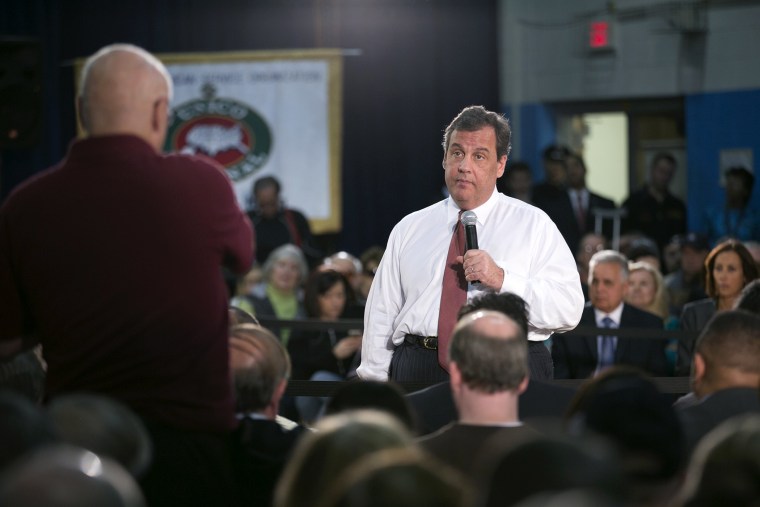For a while, New Jersey Gov. Chris Christie (R) seemed quite pleased that he hosted a series of town-hall meetings with constituents but never heard questions about his ongoing scandals.
Unfortunately for him, that didn't last and questions about the governor's bridge scandal, among other unpleasant subjects, have come up. Yesterday, Christie
addressed an important aspect of the controversy: while the investigations continue as to what he knew and when, isn't it fair to say the governor created a toxic political culture that his team took advantage of?
Chris Christie offered a challenge to critics who allege the New Jersey governor created a culture of intimidation that led to so-called "Bridgegate": Prove it. The Republican defiantly made his case Thursday at a town hall meeting in Ocean County after an attendee told the governor that his friends and family believe that Christie must have cultivated a toxic environment that allowed such an abuse to take place.
The voter, in effect, asked for talking points, wondering what argument he could make when confronting Christie's critics. The governor replied, "Point to something factually -- something that proves that" he created such a culture.
I sometimes feel as if Christie, whether deliberately or not, falls behind, sticking to old versions of events well after stories have moved on. The governor, for example, continued to cling to the possibility that there was an actual "traffic study" well after it was painfully obvious that there was no traffic study. Christie just wasn't keeping up.
And this is similar. Christie wants critics to "point to something factually" that helps prove he created a culture of pettiness, vindictiveness, and intimidation? OK, fine. That's pretty easy, actually.
Kate Zernike reported back in December on Christie's track record of bullying New Jersey officials for even minor slights.
In 2010, John F. McKeon, a New Jersey assemblyman, made what he thought was a mild comment on a radio program: Some of the public employees that Gov. Chris Christie was then vilifying had been some of the governor's biggest supporters. He was surprised to receive a handwritten note from Mr. Christie, telling him that he had heard the comments, and that he didn't like them. "I thought it was a joke," Mr. McKeon recalled. "What governor would take the time to write a personal note over a relatively innocuous comment?" But the gesture would come to seem genteel compared with the fate suffered by others in disagreements with Mr. Christie: a former governor who was stripped of police security at public events; a Rutgers professor who lost state financing for cherished programs; a state senator whose candidate for a judgeship suddenly stalled; another senator who was disinvited from an event with the governor in his own district.
Christie -- and those looking for talking points from Christie -- should probably read the whole thing. It points to quite a few documented examples of the governor using his office to punish those who've offended him in minor and inconsequential ways.
"Point to something factually"? Isn't this challenge roughly four months too late?
